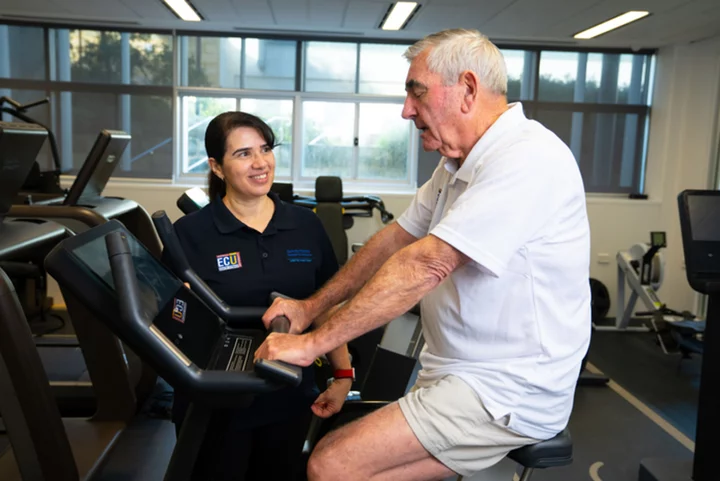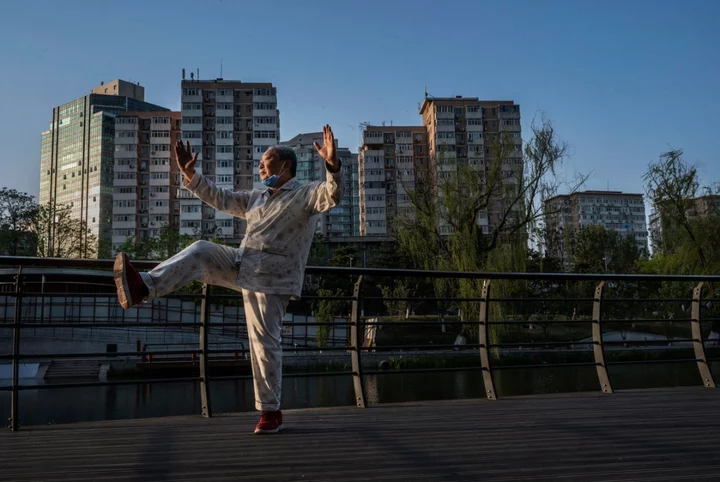
Mikel Arteta makes worrying admission over Gabriel Jesus injury
Mikel Arteta gives an injury update on Gabriel Jesus after Arsenal's 2-1 win over Sevilla in the Champions League.
2023-10-25 17:28

Meta is being sued by 41 states over ‘addictive’ content allegedly harmful to children
Mark Zuckerberg's Meta is facing lawsuits from 41 states alleging there are addictive features aimed at hooking young users. The filings allege that Meta knowingly uses features on their platforms Instagram and Facebook to pull in and addict children. States are also claiming that Meta's algorithms were designed to coerce children into harmful content with features like "infinite scroll" and persistent notifications hoooking young users to continue using the app. Meta has been accused of violating federal privacy laws for children and consumer protection laws. The 233-page joint complaint obtained by Deadline, states: "Research has shown that young people's use of Meta's Social Media Platforms is associated with depression, anxiety, insomnia, interference with education and daily life, and many other negative outcomes. "Nonetheless, Meta has continued to deny and downplay these harmful effects to the pubic and to promote its Platforms as safe for young users." The complaint also said that the company's "motive is profit, and in seeking to maximise its financial gains, Meta has repeatedly misled the pubic about the substantial dangers of its Social Media Platforms." Weighing in on the lawsuit, a Meta spokesperson said: "We share the attorney general's commitment to providing teens with safe, positive experiences online, and have already introduced over 30 tools to support teens and their families. We're disappointed that instead of working productively with companies across the industry to create clear, age-appropriate standards for the many apps teens use, the attorneys general have chosen this path." In May, U.S. Surgeon General Vivek Murthy called social media a "profound risk" for youth and encouraged parents to restrict their children's access to it. Sign up to our free Indy100 weekly newsletter How to join the indy100's free WhatsApp channel Have your say in our news democracy. Click the upvote icon at the top of the page to help raise this article through the indy100 rankings.
2023-10-25 17:25

Princess Eugenie is often told she is 'much better looking' in real life: 'Is that a compliment?'
Princess Eugenie is often told she is "much better looking" in real life and is unsure if the remark is a compliment or not.
2023-10-25 17:24

Indonesia’s Wijaya Karya Gets Some Respite on Bond Payments
PT Wijaya Karya won creditor approval to defer payment on its 331 billion rupiah ($21 million) bond due
2023-10-25 16:25

Kokusai Electric Soars 28% After Japan’s Biggest IPO Since 2018
Japanese chip-equipment maker Kokusai Electric Corp. jumped in Tokyo on Wednesday after the largest initial public offering in
2023-10-25 16:24

Just 25 minutes of daily exercise enough to cut death risk from prolonged sitting, scientists say
Working out for just about 20-25 minutes daily may be enough to cut a heightened risk of death due to a highly sedentary lifestyle, a new study finds. Adults in developed countries spend about 9-10 hours on average every day sitting down mostly while working, with the highly sedentary lifestyle linked to a heightened risk of death. The research, published in the British Journal of Sports Medicine, found just about 25 minutes of daily moderate to vigorous physical activity (MVPA) eliminates the risk of high sedentary time. Individual data from four groups of people, who were fitted with activity trackers, was pooled for the latest study by scientists, including those from The Arctic University of Norway. Researchers sought to find out whether physical activity might modify the association between sedentary time and death, and what amount of physical activity and sitting time may influence the risk. The analysis included data from nearly 12,000 people aged at least 50, who had a minimum of 4 days of 10 daily hours of activity tracker records. The participants had been monitored for at least two years, and had provided details of potentially influential factors, including their sex, educational level, weight, height, smoking history, alcohol intake and whether they had current and/or previous cardiovascular disease, cancer and/or diabetes. About 5,950 people spent fewer than 10.5 hours sitting down every day, while 6,042 clocked up 10.5 or more sedentary hours. Data from death registries found that during an average period of five years, 805 (7 per cent) people died, 357 (6 per cent) of whom spent under 10.5 hours sitting down every day and 448 of whom clocked up 10.5 hours or more. Being sedentary for more than 12 hours a day was found to be associated with a 38 per cent heightened risk of death compared with a daily tally of eight hours. But this was only among those registering fewer than 22 daily minutes of moderate to vigorous physical activity, scientists said. The study found over 22 daily minutes of moderate to vigorous physical activity was linked with a lower risk of death. Higher daily tallies of physical activity were found to be linked to an even lower risk irrespective of the amount of time spent seated every day. For instance, an extra 10 minutes a day of exercise was linked to a 15 per cent lower risk of death in those spending fewer than 10.5 sedentary hours. This extended duration of workouts was associated with a 35 per cent lower risk among those spending more than 10.5 sedentary hours every day. Citing the study’s main limitation, scientists said the research was observational and can’t establish cause and effect. The study could also not account for other potentially influential factors like diet, mobility issues and general health. However, scientists said small amounts of MVPA “may be an effective strategy to ameliorate the mortality risk from high sedentary time”. Read More Study reveals why millions of women wake up at 3.29am Sports culture is ‘intimidating’ and putting people off working out, study finds Running could be just as effective at treating depression as medication, scientists find This Chinese martial art may slow down Parkinson’s disease The best ways to work-out in 22 minutes – as study finds this is magic number for offsetting ‘negative impact of sitting’ Mick Jagger, father of eight, explains why parenting is ‘not like riding a bike’
2023-10-25 15:29

This Chinese martial art may slow down Parkinson’s disease
Practicing one particular Chinese martial art could help curb symptoms and complications of Parkinson’s disease for several years, according to a new study. Regular practice of Tai Chi, which involves sequences of very slow controlled movements, is linked with slower progression of the debilitating neuro-degenerative condition, with patients likely to require lower doses of drugs over time, according to the research published in the Journal of Neurology Neurosurgery & Psychiatry. Parkinson’s disease is a progressive disorder affecting nerves and muscles, characterised by slowness of movement, resting tremor and stiff and inflexible muscles. It is the fastest growing neurological condition in the world, with two people in the UK diagnosed with the disease every hour, according to Parkinson’s UK. There are still no cures for the condition and while drugs can improve symptoms, they don’t treat all manifestations of the disease. Previous research had hinted that Tai Chi may have some positive effects on Parkinson’s patients, but whether this can be sustained over a long term isn’t known. In the new study, scientists, including those from Shanghai Jiao Tong University in China, monitored two groups of patients with Parkinson’s disease for more than five years from January 2016 to June 2021. Disease severity, medication use, age and education level were found to be similar in both the groups. One group of 147 patients practised Tai Chi twice a week for an hour, while another group of 187 patients continued with their standard care, but didn’t practise the martial art. Doctors monitored disease severity and progression in all the participants as well as their increases in the need for medication at the start of the monitoring period and in November 2019, October 2020 and June 2021. The extent of movement, mood, sleep quality and cognition as well other symptoms like the prevalence of complications like involuntary movement (dyskinesia), abnormal muscle tone (dystonia), hallucinations and restless leg syndrome were also tracked. Scientists found that disease progression was slower at all monitoring points in the Tai Chi group, as assessed by three validated scales to assess overall symptoms, movement and balance. They also found that the number of patients who needed to increase their medication in the comparison group was “significantly higher” than it was in the Tai Chi group. Researchers said cognitive function deteriorated more slowly in the Tai Chi group, while sleep and quality of life also continuously improved. However, scientists acknowledge that the study is observational and can’t establish cause and effect. Citing another limitation of the research, they said the number of study participants was relatively small. “Our study has shown that Tai Chi retains the long-term beneficial effect on [Parkinson’s disease], indicating the potential disease-modifying effects on both motor and non-motor symptoms, especially gait, balance, autonomic symptoms and cognition,” scientists concluded. Read More The 10 products to make 2023 your healthiest year yet Tai chi improves balance, mental health in elderly: study Non-invasive deep brain stimulation ‘could provide treatment for brain diseases’ Daily exercise for just 25 minutes may cut death risk from prolonged sitting Mysterious ancient ‘human face’ rock carvings revealed by receding waters in Amazon Bumblebees ‘prioritise getting maximum calories in shortest time’
2023-10-25 15:23

Olivia Colman and Dev Patel to star in horror romance Wicker
Olivia Colman is known for her wide range of roles and her upcoming film 'Wicker' is certainly unique.
2023-10-25 15:23

The best ways to work-out in 22 minutes – as study finds this is magic number for offsetting ‘negative impact of sitting’
Just 22 minutes of housework, jogging or brisk walking per day could offset the negative effects of sitting down for too long, new research has suggested. Researchers found sitting for extended periods – for example, long stints in front of the TV or working at a desk – is associated with dying earlier. However, participating in moderate-to-vigorous physical activity (MVPA) can eliminate the risk. At the more moderate end of the scale, this could be anything from heavy cleaning around the home, playing badminton or cycling at 10-12mph, while more vigorous activities could include jogging at 6mph or faster, playing football, basketball or tennis. The study, published online in the British Journal of Sports Medicine, backs up the UK chief medical officers’ recommendation of trying to get 150 minutes of MVPA per week – roughly 21 minutes per day. The research looked at data for 11,989 people aged over 50, half of whom where women, from Norway, Sweden and the US, who had worn activity trackers which measured their MPVA. How long they spent sitting daily was also recorded. Over a five-year follow-up, 805 of the people died. Author Edvard Sagelv, from the Arctic University of Norway, told the PA news agency: “In our study, we found that only those people doing more than 12 hours per day sitting had a higher risk of death. Every minute higher MVPA showed a lower risk of death – meaning if people were doing less than 22 minutes (such as 10 minutes) there was still a lower risk of death. “However, doing 22 minutes eliminated the higher risk of death from sedentary time. This means that if doing 22 minutes or more per day, there was no excess risk from sedentary time. And, if doing more than 22 minutes per day, there was a lower risk of death overall. Basically, the more the better.” How can I get the best workout in 22 minutes? Less than half an hour a day to offset the negative effects of sitting for too long is good news for anyone who normally struggles to find time to exercise – but how can you make those 22 minutes really count? We asked a fitness pro for some suggestions… Compound exercises Ali Malik, personal trainer and founder of Fit Labs Kensington, suggested focusing on compound exercises. “Compound exercises are full-body exercises that engage with multiple muscle groups at the same time. When you are limited in time, it would be more beneficial to do a squat, for example, which engages your core, lumber spin and whole lower body, instead of a bicep curl, which doesn’t,” Malik said. “Push-ups are also great, as they engage your upper body muscles and core. If you are doing it on your knees, you use less of your legs, but a full push-up will be using your glutes and legs as well – engaging with more than one muscle group.” Planks are another great compound exercise, because “it’s predominately about your core but engages your full body, as you have to work hard to keep yourself stabilised”. Malik added: “People sometimes think dead lifts is an advanced exercise, but it’s not. Everyone does a does at least one everyday. For example, if you are picking up a bag from the floor, that’s a dead lift. It can be done with anything as light as two plastic bags filled with a water bottle each, but if you are in the gym you can use dumb bells and kettle bells.” Circuits For a well-rounded workout in 22 minutes, Malik also suggested a circuit based workout – starting with a three-minute warm-up. “This could include a cat cow stretch, a walk out [start standing up, then bend forwards and walk your body out in front of you using your hands, and then back up to standing], then jumping jacks to get your heart rate up and loosen your muscles.” Then for the circuits, it’s all about repeating multiple exercises in the same order. “I would do 10 squats, 10 press-ups and a 30-second plank. Then rest for 30 seconds, and then repeat that pattern six times. This is about 16 minutes of the workout,” said Malik. “But if you are feeling bored and would like to switch things up, you could do 10 lunges, 10 shoulder taps and leg raises instead.” Being efficient during a short workout is key, added Malik: “You don’t want to rush through the exercises to risk poor form, but you also don’t want to waste time with long five minute breaks.” Allow for a three-minute cool-down at the end. Malik explained: “It’s all about calming movements at this stage, to bring down your heart rate and relax your muscles. Start with a child pose, striking cobra – push your pelvis into the floor and then raise your chest, whilst applying pressure with both hands on either side of the body – then I would do a pigeon pose, where you have one leg out in front of you in a bent position and one leg behind you that is straight. This stretches your glute muscles.” What are the benefits? There are various benefits to exercises using this format. Malik said: “It will elevate your heart rate, put your muscles under tension to maintain and build strength, and help with your cardiovascular system.” Read More What crops will we be growing in the future, as climate change alters the landscape? As Rebecca Adlington shares heart-breaking miscarriage news: How to support others experiencing baby loss What you need to know about new research into treating cervical cancer How to do Halloween make up and still take care of your skin Which houseplants best suit your star sign? 5 of the hottest new perfume launches for autumn/winter
2023-10-25 14:30

UK Startup Investment Hits $15 Billion This Year Due to US Money
UK startups have attracted $4.9 billion in investment in the third quarter in part thanks to US backers,
2023-10-25 13:28

China spends, eyes on whether Europe lends
A look at the day ahead in European and global markets from Tom Westbrook: Giants of tech and luxury goods
2023-10-25 12:53

Arizona Diamondbacks headed to the World Series after beating Phillies for the National League pennant
The Arizona Diamondbacks defeated the Philadelphia Phillies 4-2 in Game 7 of the National League Championship Series Tuesday night, advancing to the World Series for the second time in franchise history.
2023-10-25 11:47
